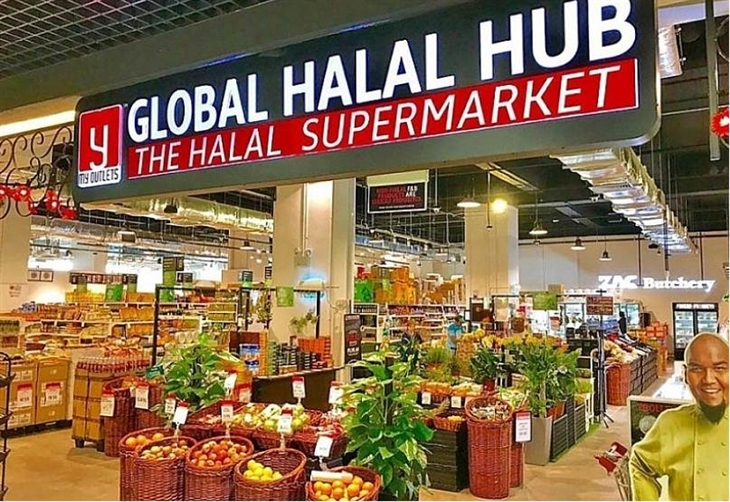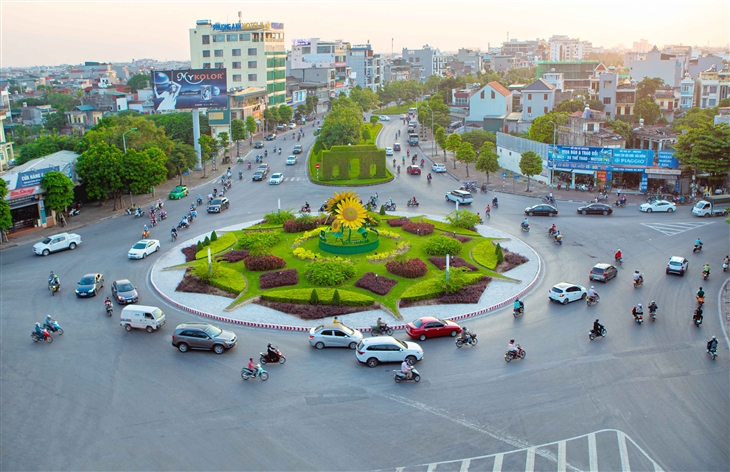Exploiting Halal market: A golden opportunity for agricultural exports
Friday, October 31,2025
AsemconnectVietnam - Halal market is a 'potential land' that has not been fully exploited by Vietnamese businesses. Early access will help businesses take advantage of the space and improve their export capacity.
On October 23, Vietnam SPS Office organized a conference on “Disseminating regulations and commitments on food safety and animal and plant quarantine (SPS) in the VIFTA and CEPA Agreements”. The conference aims to equip businesses with accurate and updated knowledge and information, especially in exploiting opportunities in the Halal market, a new market with great potential but also many challenges.
Halal market, great opportunities, wide development space
Vietnam - Israel Free Trade Agreement (VIFTA) was signed on July 25, 2023 and took effect from November 17, 2024. Vietnam - UAE Comprehensive Economic Partnership Agreement (CEPA) was signed on October 28, 2024. Both agreements have many commitments related to food safety and disease safety, especially linked to requirements of countries in the Halal market bloc.
Mr. Ngo Xuan Nam, Deputy Director of the Vietnam SPS Office, commented: “Currently, the Halal market has not received due attention from Vietnamese enterprises and has not created a 'heat' like the Chinese or EU markets. This is a new market with a lot of room for development, so proactively approaching it early will bring advantages to enterprises in the coming time”.
According to the latest data and forecasts, the Halal market capacity is estimated at about 10,000 billion USD, while Vietnam's agricultural and food export turnover is expected to reach 70 billion USD in 2025, with possibility of increasing to 100 billion USD in the coming years. This shows great potential for development, while emphasizing need to "warm up" the market, providing full information on regulations and market capacity to orient production and export effectively.
Each market has its own regulations on food safety, animal and plant quarantine and industry standards. Therefore, it is essential to strengthen guidance activities, help businesses access full information and organize appropriate production, especially in the Halal market.
SPS measures are mandatory, unlike TBT measures (Technical Regulations and Standards) which can be applied flexibly. Mr. Ngo Xuan Nam emphasized: “There have been Vietnamese enterprises that, due to negligence, violated mandatory regulations of the market (not the Halal market). When not complying with requirements such as updating application for extension of export codes on time, the system will automatically close and the enterprise cannot export products. This is an important lesson that other enterprises need to pay attention to.”
Mandatory regulations may include: Updating documents 3-6 months in advance, complying with pesticide or antibiotic residue limits on products. If not complied, enterprises may be warned, returned, destroyed or banned from import. Strict compliance is a prerequisite to maintain export capacity and reputation in the international market.
Key solutions to help businesses access the global Halal market
To help businesses overcome this challenge, Vietnam SPS Office proposes a number of groups of solutions.
First, communication is a key factor. Businesses need to clearly understand the "path" and mandatory regulations of the market to avoid violations. Disseminating information and detailed instructions helps businesses orient production and export effectively.
Second, training and coaching for businesses is an essential solution. Most Vietnamese businesses, especially small and medium-sized enterprises, are limited in their capacity to meet SPS/TBT requirements. Improving capacity through training courses, practical guidance and in-depth consulting will help businesses be more proactive in complying with regulations.
Third, digital transformation in SPS information management is an effective support tool. This tool will help businesses promptly grasp food safety standards and animal and plant quarantine, not only in the Halal market but also in other export markets.
Fourth, strengthen good agricultural practices (GAP), technical guidance on production, supervision and close inspection from central and local agencies, as well as apply science and technology to improve product quality.
Mr. Nguyen Thanh Duy, Deputy Director of the Middle East - Africa Department (Ministry of Foreign Affairs) affirmed that global Halal market is a very large and potential market. Muslim countries have high demand for products from Vietnam and maintain good trade relations with Vietnam.
With many strengths in production and services meeting Halal standards, Vietnam has potential to become an important link in the global supply and production chain. The Government and ministries and sectors have focused on supporting localities and enterprises in exploiting Halal market, while acknowledging increasing interest of enterprises and localities in this potential market.
However, Halal is still a new concept for many State management agencies, localities and enterprises. The State management system on products, services, Halal certification and legal basis for management are not yet complete. Many enterprises and localities have difficulty in applying for Halal certification, the cost of certification is still high, while Vietnam does not have a synchronous Halal ecosystem, linking between sectors and has not formed a focal agency or overall strategy for Halal industry development. Although international cooperation on Halal has been promoted, it is still not synchronous and comprehensive. In addition, source of international standard Muslim human resources is still lacking, not meeting needs of developing the Halal industry on a large scale to serve exports.
To effectively exploit potential of the Halal market, Mr. Nguyen Thanh Duy proposed strategic solutions: Early completion of legal framework and regulations related to Halal; promoting cooperation between Vietnam and Muslim and non-Muslim partners; enhancing promotion and advertising of Halal products; supporting and connecting businesses and localities with global Halal partners and markets. At the same time, it is necessary to promote two-way information and propaganda about Halal, helping businesses and management agencies fully grasp opportunities and regulations, thereby developing the Halal industry sustainably and effectively.
Mr. Le Viet Binh, Deputy Chief of the Southern Office of Ministry of Agriculture and Environment, commented that although Halal market has not yet received much attention from Vietnamese enterprises, this is completely objective and not pessimistic. In fact, with Vietnam's agricultural export turnover in 2024 reaching 62.5 billion USD, the Halal market only accounts for a very small proportion, about a few hundred million USD, less than 1 billion USD. This is clearly a new market, both in concept and approach.
However, potential of this market is huge. Mr. Binh cited in a conference about 2 years ago, Vietnam's livestock industry alone was able to participate in the Halal market with a short-term export turnover estimated at about 3 billion USD. Livestock products, such as beef or some poultry products, are completely capable of expanding and increasing turnover in the coming time.
Source: Vitic/ congthuong.vn
Halal market, great opportunities, wide development space
Vietnam - Israel Free Trade Agreement (VIFTA) was signed on July 25, 2023 and took effect from November 17, 2024. Vietnam - UAE Comprehensive Economic Partnership Agreement (CEPA) was signed on October 28, 2024. Both agreements have many commitments related to food safety and disease safety, especially linked to requirements of countries in the Halal market bloc.
Mr. Ngo Xuan Nam, Deputy Director of the Vietnam SPS Office, commented: “Currently, the Halal market has not received due attention from Vietnamese enterprises and has not created a 'heat' like the Chinese or EU markets. This is a new market with a lot of room for development, so proactively approaching it early will bring advantages to enterprises in the coming time”.
According to the latest data and forecasts, the Halal market capacity is estimated at about 10,000 billion USD, while Vietnam's agricultural and food export turnover is expected to reach 70 billion USD in 2025, with possibility of increasing to 100 billion USD in the coming years. This shows great potential for development, while emphasizing need to "warm up" the market, providing full information on regulations and market capacity to orient production and export effectively.
Each market has its own regulations on food safety, animal and plant quarantine and industry standards. Therefore, it is essential to strengthen guidance activities, help businesses access full information and organize appropriate production, especially in the Halal market.
SPS measures are mandatory, unlike TBT measures (Technical Regulations and Standards) which can be applied flexibly. Mr. Ngo Xuan Nam emphasized: “There have been Vietnamese enterprises that, due to negligence, violated mandatory regulations of the market (not the Halal market). When not complying with requirements such as updating application for extension of export codes on time, the system will automatically close and the enterprise cannot export products. This is an important lesson that other enterprises need to pay attention to.”
Mandatory regulations may include: Updating documents 3-6 months in advance, complying with pesticide or antibiotic residue limits on products. If not complied, enterprises may be warned, returned, destroyed or banned from import. Strict compliance is a prerequisite to maintain export capacity and reputation in the international market.
Key solutions to help businesses access the global Halal market
To help businesses overcome this challenge, Vietnam SPS Office proposes a number of groups of solutions.
First, communication is a key factor. Businesses need to clearly understand the "path" and mandatory regulations of the market to avoid violations. Disseminating information and detailed instructions helps businesses orient production and export effectively.
Second, training and coaching for businesses is an essential solution. Most Vietnamese businesses, especially small and medium-sized enterprises, are limited in their capacity to meet SPS/TBT requirements. Improving capacity through training courses, practical guidance and in-depth consulting will help businesses be more proactive in complying with regulations.
Third, digital transformation in SPS information management is an effective support tool. This tool will help businesses promptly grasp food safety standards and animal and plant quarantine, not only in the Halal market but also in other export markets.
Fourth, strengthen good agricultural practices (GAP), technical guidance on production, supervision and close inspection from central and local agencies, as well as apply science and technology to improve product quality.
Mr. Nguyen Thanh Duy, Deputy Director of the Middle East - Africa Department (Ministry of Foreign Affairs) affirmed that global Halal market is a very large and potential market. Muslim countries have high demand for products from Vietnam and maintain good trade relations with Vietnam.
With many strengths in production and services meeting Halal standards, Vietnam has potential to become an important link in the global supply and production chain. The Government and ministries and sectors have focused on supporting localities and enterprises in exploiting Halal market, while acknowledging increasing interest of enterprises and localities in this potential market.
However, Halal is still a new concept for many State management agencies, localities and enterprises. The State management system on products, services, Halal certification and legal basis for management are not yet complete. Many enterprises and localities have difficulty in applying for Halal certification, the cost of certification is still high, while Vietnam does not have a synchronous Halal ecosystem, linking between sectors and has not formed a focal agency or overall strategy for Halal industry development. Although international cooperation on Halal has been promoted, it is still not synchronous and comprehensive. In addition, source of international standard Muslim human resources is still lacking, not meeting needs of developing the Halal industry on a large scale to serve exports.
To effectively exploit potential of the Halal market, Mr. Nguyen Thanh Duy proposed strategic solutions: Early completion of legal framework and regulations related to Halal; promoting cooperation between Vietnam and Muslim and non-Muslim partners; enhancing promotion and advertising of Halal products; supporting and connecting businesses and localities with global Halal partners and markets. At the same time, it is necessary to promote two-way information and propaganda about Halal, helping businesses and management agencies fully grasp opportunities and regulations, thereby developing the Halal industry sustainably and effectively.
Mr. Le Viet Binh, Deputy Chief of the Southern Office of Ministry of Agriculture and Environment, commented that although Halal market has not yet received much attention from Vietnamese enterprises, this is completely objective and not pessimistic. In fact, with Vietnam's agricultural export turnover in 2024 reaching 62.5 billion USD, the Halal market only accounts for a very small proportion, about a few hundred million USD, less than 1 billion USD. This is clearly a new market, both in concept and approach.
However, potential of this market is huge. Mr. Binh cited in a conference about 2 years ago, Vietnam's livestock industry alone was able to participate in the Halal market with a short-term export turnover estimated at about 3 billion USD. Livestock products, such as beef or some poultry products, are completely capable of expanding and increasing turnover in the coming time.
Source: Vitic/ congthuong.vn
Gia Lai: 'Golden' raw material area for agricultural exports
Main commodity groups imported from New Zealand in 9 months of 2025
Import and export surpassed 700 billion USD mark
Cashew nut exports maintain steady growth momentum
Global coffee output in 2025 - 2026 crop year is forecast to reach a record
Vietnam’s pork market in October 2025
Vietnam’s seafood market in October 2025
Vietnamese goods overcome technical barriers, penetrate deeply into New Zealand market
RCEP creates new momentum for small and medium-sized enterprises to integrate internationally
Vietnam’s steel market in October 2025
Main commodity groups exported to New Zealand in first 9 months of 2025
Exports to Laos increased by 79.7% in first 9 months of 2025
Vietnam Fertilizer Market – October 2025
Vietnam’s animal feed market in October 2025: Prices continue to decline

Plan of Hai Duong province for a period of 2021 - 2030, ...
Organize space reasonably and harmoniously, focusing on connecting Hai Duong in common development space, actively contributing to the ...Plan of Hau Giang province in a period of 2021 - 2030, ...
Sustainable forestry development program in a period of ...

LION Championship 25 to feature title showdowns in Khanh ...
LION Championship 25 will take place at Cam Ranh Square in south-central Khanh Hoa province, at 20:00 on August 16, featuring two of the ...Bai Dinh Pagoda named outstanding destination with ...
Party chief attends special political–art programme “Under ...



